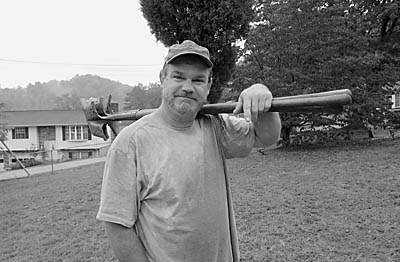Dallas Dunn and the Lost Art of Gravedigging
Interview by Amber Griffith
Photographs by Michael Keller
Dallas Dunn is a West Virginia gravedigger. He carries on an occupation that has been passed down to him through his family. The son of Charles Leo and Edith Dunn, Dallas grew up in Cross Lanes, Kanawha County. I interviewed him recently at his home in Nitro, on the deck by his swimming pool on a nice, fall evening. He spoke freely of his occupation as a gravedigger and all that it entails. -Amber Griffith

Dallas Dunn is a third-generation gravedigger from
Kanawha County. "It takes a different kind of person to go out any
day of the week, any hour of the day, and in any kind of weather to
dig a grave," he says.
Amber Griffith: So, you are a gravedigger. How long have you been doing this?
Dallas Dunn: Well, I am 47-years old and have been doing this for [more than] 30 years. I got started with my dad when I was 10. I would go with my dad on weekends and whenever I got the chance to go. My dad was a gravedigger for about 40 years. His dad, my grandfather Charles Lee Dunn, was also a gravedigger.
My dad and I would drive all over the state, mostly in the country at old country cemeteries. When families had a death, the funeral director would call my dad to dig the grave, because in certain areas they didn't have anyone to dig the graves. Sometimes, the families would dig the graves themselves, and we would take a vault and place it in the grave, and the families would cover them up.
AG: So, gravedigging was something that was passed down to you?
DD: Yes. My dad started it as a side job, and then we got busier and began to build a reputation. People began to call us when there was a death in their family, and we would go dig the grave. We traveled all over West Virginia. It didn't matter whether it was winter, summer, day, or night.
AG: What are some of the things you like about your job?
DD: I like being outside, the physical work, and I like all the people you meet. I like the old country atmosphere. You meet somebody, and you remember them, and they remember you. You spend a lot of time talking with older people who used to do what I do.
AG: Do you [usually] dig in church cemeteries?
DD: A lot of them are church cemeteries, and a lot of them are old family cemeteries. I have even started family cemeteries where people have died and wanted to be buried on their own property. I've done that several times in the last year.
AG: And what are some of the dislikes?
DD: The hours are bad. If somebody calls you, you have to go. As a kid growing up, we would go and dig on Christmas Day even. [One time], after we had Christmas dinner, my dad and I drove all the way on the other side of Clendenin to dig a grave. I've missed holidays, birthdays, anniversaries, and funerals for my own family and friends, because a grave needed to be dug before the funeral the next day. It's not something you can put off until later. You have to do it right then.
AG: Tell me how gravedigging used to be.
DD: It used to be a community thing, years ago. They would ring a bell at the church when somebody died, and men within the community would get together and dig a grave. It was kind of like when someone would build a barn, they would all get together for a barn raising. It was the same with gravedigging. When someone died, they would all dig the grave together. There would be someone in charge, usually the oldest man in the community, and he knew where to dig the grave. They would dig the grave by hand.
You can read the rest of this article in the Winter 2002 issue of Goldenseal, available in bookstores, libraries or direct from Goldenseal.